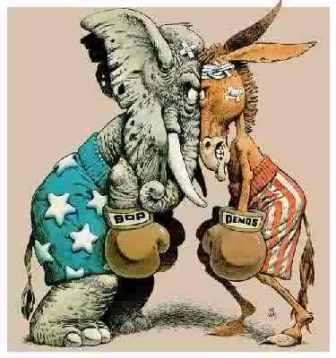|
restoring our biblical and constitutional foundations
|
The Post-Political Church
Over the span of 31 years of teaching my understanding of the Christian faith and theology has changed in several significant ways. One of the most important is that I have come to identify myself not so much with the Reformers of the sixteenth century but rather with the Anabaptist dissenters whom they opposed (often to the death) – those simple men and women who believed that the church needed, not reforming, but rebuilding from the ground up.
This process of rebuilding involved more than merely insisting upon believers (or adult) baptism as the only legitimate form of baptism. Of far greater significance was the fact that the Anabaptists of the sixteenth century, precisely because they held to believers baptism, taught that it was necessary for the church to be completely separate from the state, since the state included all members of society. (Today, of course, the principle of religious freedom has been written into the federal Constitution of the United States.) Moreover, because in their theology the church consisted only of believers, the Anabaptists were convinced that every Christian was a Gospel missionary and therefore must preach and evangelize in order to bring people to faith. Indeed, since Christ had commanded His followers to love even their enemies, it was impossible for a Christian to restrict love and service only to fellow Christians.
Perhaps the most unique aspect of the Anabaptist tradition was the belief that to be a Christian implied giving up everything in radical obedience to Christ. This emphasis has great relevance today. If modern believers accept the responsibility thus laid upon them by their Lord, they must continually be asking the question: What does radical discipleship mean for a modern Christian? How can we obey in every situation Jesus’ command to love God and our fellow human beings? Here again we are confronted with foundational concepts of discipleship. The claim of the Christian Gospel is that God, because of His unfailing mercy and love, offers to mankind forgiveness and reconciliation in the person of Jesus Christ. The church, therefore, is the community in which God’s transforming love is known and translated into the world on His behalf. In this sense one could argue that early Anabaptism was the first modern missionary movement, prior even to the one launched by William Carey – which may help to explain why the Anabaptist movement spread like wildfire in its earliest years. As heirs to the Anabaptist tradition, Baptists likewise believe in missions and world evangelism. But while this may be our belief, our practices are frequently inconsistent with it. Many churches have forgotten that it is only through self-sacrificing love that God works to bring people into His kingdom. All of this, I think, is more-or-less self evident, but we have not taken it very seriously in fleshing out our ecclesiology. I think it is time we thought through our theory on this question anew, not to bring it into conformity with our practice, but to bring it in line with the Scriptures.
 It is precisely this responsibility to witness and
minister in the world that is avoided in our staid, bourgeois memberships,
with their comfortable adjustment to laissez-faire capitalism and their
unwillingness to question the political status quo. I wish we could sense
how closely interwoven our religion and politics have become. For many
evangelical Christians religion has become the principal justification for
political involvement. Thus everything that carries a “Christian” message
is legitimized and justified in terms of political commitment. This is the
new ecclesiology. No matter how biblically uninformed or banal the
thought, any religious stance is legitimized thanks to the political
message behind
it. Has anyone failed to notice just how deeply “God-and-Country”
nationalism has come to permeate American society? This is nothing but
pure idolatry. I can understand our mass media allowing itself to be
commandeered for propagandistic purposes. But as an evangelical who values
highly the authority and inspiration of Scripture and the sole Lordship of
Jesus Christ, it is disturbing to see the church co-opted by the state for
the same purposes.
It is precisely this responsibility to witness and
minister in the world that is avoided in our staid, bourgeois memberships,
with their comfortable adjustment to laissez-faire capitalism and their
unwillingness to question the political status quo. I wish we could sense
how closely interwoven our religion and politics have become. For many
evangelical Christians religion has become the principal justification for
political involvement. Thus everything that carries a “Christian” message
is legitimized and justified in terms of political commitment. This is the
new ecclesiology. No matter how biblically uninformed or banal the
thought, any religious stance is legitimized thanks to the political
message behind
it. Has anyone failed to notice just how deeply “God-and-Country”
nationalism has come to permeate American society? This is nothing but
pure idolatry. I can understand our mass media allowing itself to be
commandeered for propagandistic purposes. But as an evangelical who values
highly the authority and inspiration of Scripture and the sole Lordship of
Jesus Christ, it is disturbing to see the church co-opted by the state for
the same purposes.
Years ago Jacque Ellul warned us that the greatest danger to liberty in Western society proceeds
from the military-political state born of a dream of utopian perfection on
earth. It seems clear to me that Ellul has touched on something of very
great importance. As one who rejected out of hand the para-Marxist realism
of my practical theology professors in Basel, I find it just as easy to
part company with those on the theological right who argue that
evangelicals should inject Christianity into politics. A close reading of
the Gospels would show that the opposite is true. Neither
 Jesus nor His
disciples ever engaged in or showed any interest in politics. Our Lord
refused to be the political liberator of Israel. I therefore fully agree with the Anabaptists that the
state is meant to be secular and that a dualism exists between church and
state, between political power and the proclamation of the Gospel. There
is in my opinion neither “Christian” liberalism nor “Christian”
conservatism. Equally valid (or invalid) perspectives can be found on both
sides, but there are no Christian grounds for preferring one side
over the other. If Jesus was a capitalist (or a socialist, or a
Republican, or a Democrat, or a Libertarian), I fail to see anywhere in
the Gospels where He has made that known to us. The fact is that political
loyalties are always relative and determined for purely individual and
conscience reasons.
Jesus nor His
disciples ever engaged in or showed any interest in politics. Our Lord
refused to be the political liberator of Israel. I therefore fully agree with the Anabaptists that the
state is meant to be secular and that a dualism exists between church and
state, between political power and the proclamation of the Gospel. There
is in my opinion neither “Christian” liberalism nor “Christian”
conservatism. Equally valid (or invalid) perspectives can be found on both
sides, but there are no Christian grounds for preferring one side
over the other. If Jesus was a capitalist (or a socialist, or a
Republican, or a Democrat, or a Libertarian), I fail to see anywhere in
the Gospels where He has made that known to us. The fact is that political
loyalties are always relative and determined for purely individual and
conscience reasons.
Now, to state that the church should reject any form of allegiance with politics does not imply the separation of church from society or that Christians should not hold or express political views. Quite the opposite is true. Acknowledging Jesus as Lord over all things means that we will seek to be biblically informed about our political decisions and discussions. But it does not mean that a Christian politician can claim to support distinctively “Christian” policies any more than an auto mechanic can claim that he practices distinctively “Christian” car repair. It is the duty of the church to penetrate society as salt and light – this is acknowledged by all – but it fails in that duty when it rubberstamps the platform of politicians of any stripe. (This is one reason I do not support inviting a sitting president to speak at annual religious conventions.) According to the Scriptures, the church is not a political community at all. It is a brotherhood that proclaims Jesus Christ as Lord and that expects the coming of His kingdom – or, to put it another way, a brotherhood that lives with a view to the time when Christ will ultimately prevail over all earthly kingdoms. The church knows, therefore, that it lives in the midst of an eschaton that has not yet come, and that the polar realties of the church and the world are the twin sociological units within which it lives. We must be very careful, then, not to confuse the kingdom of heaven with the kingdom of man even as we love and serve the world in Jesus’ name. Whatever political differences exist between Christians can be transcended by the common ground of the cross and empty tomb.
August 28, 2007
David Alan Black is the editor of www.daveblackonline.com.